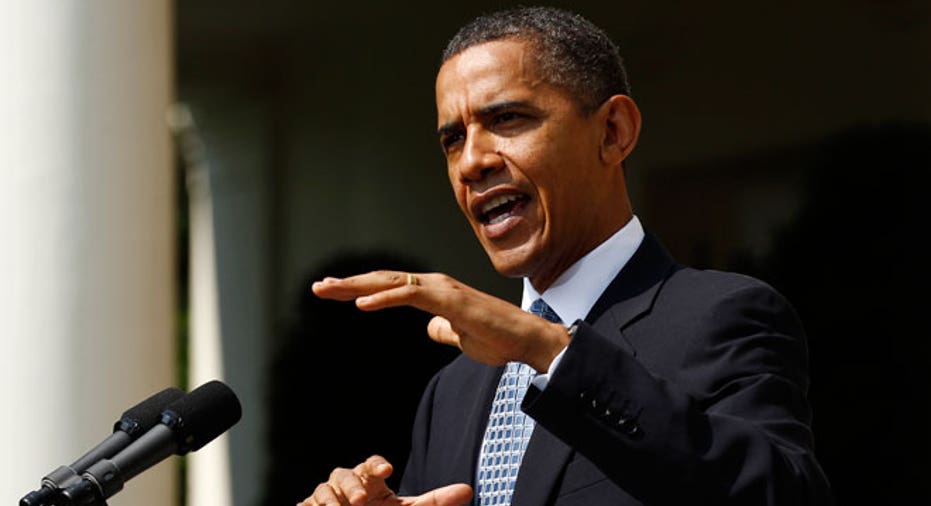Obama Holds Small Business Roundtable, Urges Congress to Act on ‘To-Do’ List

President Obama Wednesday called upon Congress to take action on the “To Do List” of small business legislation. Ahead of National Small Business week, the president also held a roundtable discussion on his proposed legislation with U.S. entrepreneurs and Small Business Administrator and president Karen Mills.
Among the items in Obama’s proposal is legislation that would give companies a 20% tax credit for moving overseas operations back to the U.S., according to a White House release. The president is also asking Congress to give a 10% income tax credit to businesses that either create new jobs or increase wages in 2012, and to extend 100% expensing throughout the year for all businesses.
The White House said the proposal will help 2 million ‘real’ small businesses and focus on middle-class workers, because the proposed credits do not apply to wages above $110,100.
The National Economic Council also released a report Wednesday entitled “Moving America’s Small Businesses & Entrepreneurs Forward,” highlighting initiatives put in place so far during the Obama administration.
“To help them expand and hire, the president has signed a total of 18 tax cuts for small businesses, from greater expensing to the president’s signature call to eliminate capital gains taxes on investments in small businesses,” the report states. “The president has also established two new small business lending funds and expanded Small Business Administration lending programs, which have hit an all-time record.”
The report states the president has invested more than $4 billion in 332 banks and community development loan funds through the new Small Business Lending Fund.
Kevan Chapman, senior media manager for the National Federation of Independent Business, said while tax credits may give some businesses incentive to hire, for the majority it won’t be enough to make a move to add employees.
“When you look at the way the tax credit is structured, and then take into account how much it costs to actually hire an employee, a 10% tax credit is nowhere near the cost of adding someone to the payroll,” Chapman said. “If you are treading water, or not in the position to start hiring, it’s simply not enough to encourage that step. Phrasing this as a mechanism that will spur hiring is not an accurate thing to do,” Chapman said.
One piece of the legislation that the NFIB is on board with is extending bonus depreciation for small businesses, which allows them to write off 100% of investments up to $500,000 in equipment the year after the investment was made. This reduced to 50% in 2011, and without Congressional action will fall to $139,000 in 2012 and $25,000 in 2013. The NFIB focused on this heavily in 2010, but Section 179, or expensing the purchase cost, is the groups' top expensing priority today due to its popularity with the NFIB's membership
“One of the big problems in the tax code is instead of a long-term extension, you need to look at the big picture,” Chapman said. “We are coming up on ‘Taxmageddon’ for small businesses, and this will be a very bad environment for small business if no action is taken.”
The NFIB is urging for other tax credit extenders, including the self-employed health insurance deduction, which allows self-employed business owners to deduct the cost of insurance for themselves and their families, as well as reducing the holding period for businesses converting from C-corporations to S-corporations. Businesses that do this are required to hold their appreciated assets for up to 20 years or face double taxation.
Finally, the NFIB is advocating for start-up deductions for new small businesses, which allows small businesses to deduct up to $10,000 for start-up costs.
House Speaker John Boehner (R-Ohio) said he will be holding a vote on these extenders before Congress in the near future.
House Small Business Committee Chairman Sam Graves (R-MO) said that despite the push for legislation Wednesday, Obama’s policies have done more to hurt small business than help in the past four years.
“Even though the administration may tout their programs intended to help small firms, the majority of the president's policies have burdened them, including the health care law, the rate of over-regulation, the deficit-spending, and the constant threats of tax increases. In order to help small businesses, we must provide more stability and relief on issues like taxes, regulations, energy costs, and government spending. Over the last 18 months, the House has addressed these problems by passing more than two dozen jobs bills that are still awaiting Senate action,” Graves said in a statement. “On the eve of National Small Business Week, I hope the president will call on the Senate to vote on those jobs bills and work with House Republicans on providing more certainty for America’s small business job creators.”
Chapman said advocacy for small businesses is important and necessary, however without tangible benefits, it is meaningless.
“The president doesn’t do a great deal to help [lessen uncertainty] with what he is advocating for today,” he said. “It doesn’t get to helping these businesses that are struggling. We’d like to see a greater focus on this from the president and Congress.”
The NEC report, however, has a different take.
“In the last 26 months we have created 4.25 million private sector jobs – many of them at small and new businesses – and triple the number of jobs added during the last economic recovery in 2002-2004. We know there is still a great deal of work to be done, but the actions we’ve taken – and the partnerships we’ve built – are creating a more inclusive economy, a more resilient economy, and an economy that is driven by a strong and growing middle class,” the report stated.



















